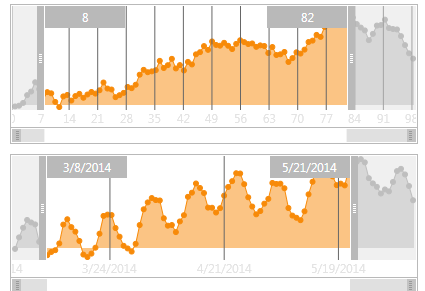RangeControlClientAreaView Class
Changes the chart client view to Area view.
Namespace: DevExpress.Xpf.Charts.RangeControlClient
Assembly: DevExpress.Xpf.Charts.v19.2.dll
Declaration
Remarks
To display the chart client area view within a range control, you need to assign a RangeControlClientAreaView instance to the ChartRangeControlClient.View property.

Example
This example demonstrates how to set up a range control with the numeric chart client to display a chart with numeric data in the range control’s background.
Usually, in order to provide data to a chart numeric range control client, you need to specify a datasource using the ChartRangeControlClient.ItemsSource property and specify the required data fields via ChartRangeControlClient.ArgumentDataMember and ChartRangeControlClient.ValueDataMember properties (for more information, see the How to: Bind a Numeric Chart Range Control Client to a List of Custom Objects example). Note that when the ArgumentDataMember property is specified, chart points are sorted by arguments in the ascending order.
In the current example, a numeric chart client is bound to an array of integers using the ItemsSource property. In addition, you can bind a numeric chart client to other simple type objects (short, integer, long, double, decimal, float types , etc.). In this scenario the data values are shown in the same order in which elements have been added to the array.
Note
A complete sample project is available at https://github.com/DevExpress-Examples/how-to-bind-a-numeric-chart-range-control-client-to-an-array-of-simple-type-objects-e5110.
Imports Microsoft.VisualBasic
Imports System
Imports System.Collections.Generic
Imports System.Windows
Namespace NumericRangeControlClient
Partial Public Class MainWindow
Inherits Window
Private dataArray() As Integer = { 0, 4, 2, 5, 4, 5, 3, 4, 8, 9, 10 }
Public Sub New()
InitializeComponent()
DataContext = dataArray
End Sub
End Class
End Namespace